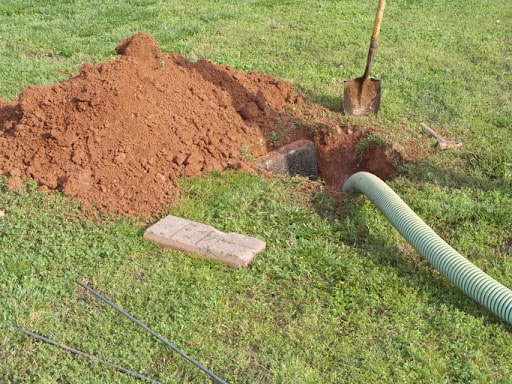Septic systems are essential for homes not connected to a public sewer system. They treat and dispose of household wastewater in an underground tank and drain field. Using and maintaining your septic system properly ensures longevity and effectiveness. Learn the top seven tips for maintaining your septic system to keep it working well for many years.

- Mind what you flush: Septic systems are designed to treat and dispose of human waste and biodegradable materials, so avoid flushing anything besides number one, number two, and toilet paper. This includes “flushable” wipes, feminine hygiene products, paper towels, and facial tissues.
- Think at the sink: Even with a garbage disposal, cooking grease, coffee grounds, and fatty food scraps should never go down the kitchen sink if you have a septic system. Dairy products are also harmful to pour down the drain because the lack of oxygen in the septic tank impairs the breakdown process.
- Use cleaning chemicals sparingly: Cleaning products can harm the good bacteria in a septic system. Therefore, it’s important to avoid antibacterial soap and disinfectants containing ammonia. Check your laundry detergent and toilet bowl cleaner as well to ensure they don’t contain bleach. Finally, never use a chemical drain cleaner with a septic system.
- Conserve water: Unlike public sewer systems, septic tanks can only handle so much wastewater at a time. Conserving water reduces the strain on the system and prevents overflows. Fix leaky faucets promptly, use low-flow fixtures, and avoid running multiple water sources simultaneously. Additionally, spread out water usage throughout the week instead of doing all the laundry or dishes on the same day.
- Protect the drain field: The drain field is where treated wastewater disperses into the soil. Keep this part of your yard clear of trees, bushes, and concrete structures. Then, don’t park or drive over the drain field, as this can compact the soil and harm the septic system.
- Schedule regular inspections: Professional septic inspections help spot small issues before they become major problems. Schedule an inspection every one to three years, before buying or selling property, and anytime you notice signs of septic trouble.
- Pump the septic tank regularly: A septic tank holds all the solid waste that enters the system. Over time, the tank fills up and must be pumped. Failing to do so can lead to solids entering the drain field or wastewater backing up into your home. That’s why it’s so important to keep up with this service every three to five years or as needed based on your tank’s size and the amount of use it receives.
Trinity Liquid Waste is a trusted provider of septic tank pumping, septic inspections, and septic repairs for residential and commercial customers in the San Francisco Bay Area. Our team of professionals aims to keep your system in top condition, drawing on over 25 years of industry experience. The next time you need septic services, don’t hesitate to reach out! You can call us at 510-874-6489 or fill out our online contact form.
